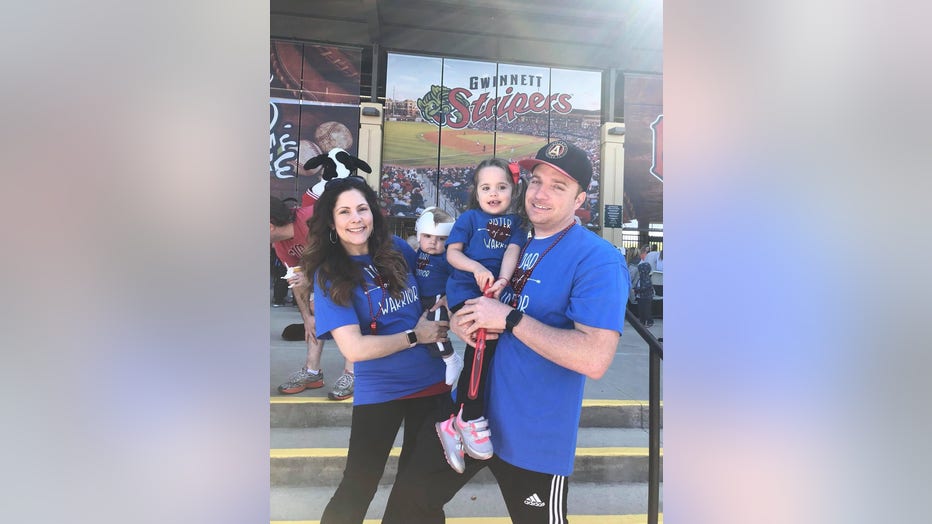Acworth first grader thriving 6 years after heart surgery

Acworth boy thriving years after heart surgery
He may be too young to remember what it was like, but an Acworth boy has made tremendous progress after undergoing surgery to repair a defect. The once fragile baby, is now a fun-loving first-grader with so much life ahead of him.
ACWORTH, Ga. - Axel Crate is a pretty typical first-grader, playing with his big sister Layla, and showing few signs, their mom Tara Crate says, of everything he has been through, that they’ve been through.
"You realize how much of a miracle he is, and how much of a miracle you’ve walked through on this journey," Crate says. "When I got pregnant with Axel, it was actually a surprise just from the beginning."
During a pregnancy checkup, a doctor heard a heart murmur, but a specialist reassured Tara and Justin Crate their baby was fine.
And, Axel seemed healthy when he was born in August 2017 at Northside Hospital in Atlanta.
But, the morning the Crates were supposed to go home, Tara says, a nurse came in, looking worried.
"She asked us how long he had been breathing (like this) or looked the way that he looked," Crate remembers.
Axel, who has fluid in his lungs, was taken by ambulance to Children’s Healthcare of Atlanta at Egleston for more tests.
Two days later, the Crates were sent home and told to keep a close eye on him.
Six weeks later, Tara Crate brought him to the cardiologist for a 6-week checkup, and was told to bring Axel back to Children’s Healthcare right away because he needed emergency surgery.
"I just remember losing it in that moment," his mother says.
Axel had three congenital heart defects—coarctation of the aorta, a ventricular septal defect, and a bicuspid aortic valve.
The most critical was a coarctation of his aorta, a severe narrowing of the main blood vessel that carries oxygen-rich blood from Axel’s heart to the rest of the body.

Tara and Justin Crate of Acworth, Georgia, pose with their children.
Dr. Divya Suthar, an assistant professor of pediatrics at the Emory School of Medicine and a Children’s Healthcare cardiologist, says Axel Crate had what they consider a critical congenital heart defect.
"Typically, these infants will require a corrective heart surgery within the first year of life," Suthar says. "If you’re not able to provide the surgery in the first year of life, they will not survive."
Dr. Suthar says most of these types of heart defects are detected either before a baby is born or through newborn screenings at the hospital.
The first warning sign parents may notice, she says, is that a baby stops feeding normally.
"They’re not able to take their bottle," Dr. Suthar explains. "They are either extremely fussy or at times they are just not active. They’re just like sleepy and lethargic. And parents can oftentimes see that their feet are extremely cold."
Axel Crate, whose heart was about the size of a walnut, was now facing cardiothoracic surgery.
"I’m someone who tries to have all of my hope and strength and faith in God that this won’t be us, this won’t be our situation," his mother says. "And it was, and it’s extremely scary."
But instead of opening Axel’s chest, Children’s surgeons went in through his side to repair his aorta.
Hours later, in the cardiac ICU, the Crates were reunited with Axel.
"He looked so delicate and fragile," Tara Crate remembers. "I thought, ‘Can I touch him to hold his hand?’"

Acworth boy thriving 6 years after heart-defect surgery
A Cobb County first-grader is thriving today after a pretty rough start in life. Axel crate was just six-weeks-old when he had to undergo emergency heart surgery.
It’s been 6 years.
Axel Crate still has some muscle weakness on his left side, but he’s come a long way.
"You hold on to the milestones of saying, ‘Oh, my goodness, he’s walking or, ‘Oh, my gosh, he can drink from a cup,’" Tara Crate says. "You never realize that those are actually major things for some kids."
And Tara Crate knows other families will follow in their footsteps.
"And, for people that are scared, the advice is ask questions," she says. "You are your child’s best advocate. No one knows your child the way that you do. And have hope. Hold on to your hope, because hope is what is going to get you through."
Crate also recommends families reach out to the American Heart Association, which she says provided information and resources to help them after Axel’s diagnosis.
You can learn more about congenital heart disease at heart.org.

